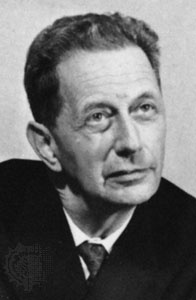Lwoff, André
French biologist
in full André-Michael Lwoff
born May 8, 1902, Ainay-le-Château, France
died Sept. 30, 1994, Paris
 French biologist who contributed to the understanding of lysogeny, in which a bacterial virus, or bacteriophage, infects bacteria and is transmitted to subsequent bacterial generations solely through the cell division of its host. Lwoff's discoveries brought him (with François Jacob (Jacob, François) and Jacques Monod (Monod, Jacques)) the Nobel Prize for Medicine or Physiology in 1965.
French biologist who contributed to the understanding of lysogeny, in which a bacterial virus, or bacteriophage, infects bacteria and is transmitted to subsequent bacterial generations solely through the cell division of its host. Lwoff's discoveries brought him (with François Jacob (Jacob, François) and Jacques Monod (Monod, Jacques)) the Nobel Prize for Medicine or Physiology in 1965.Lwoff, born of Russian-Polish parents, was educated at the University of Paris. He spent most of his research career at the Pasteur Institute in Paris, serving on the board of directors from 1966 to 1972. From 1959 to 1968 he was also a professor of microbiology at the Sorbonne in Paris. When he retired from the Pasteur Institute in 1968, he served as director of the Cancer Research Institute at nearby Villejuif until 1972.
In his prizewinning research, Lwoff showed that, after infection, the virus is passed on to succeeding generations of bacteria in a noninfective form called a prophage. He demonstrated that under certain conditions this prophage gives rise to an infective form that causes lysis, or disintegration, of the bacterial cell; the viruses that are released upon the cell's destruction are capable of infecting other bacterial hosts. Lwoff also discovered that vitamins (vitamin) serve both as growth factors for microbes and as coenzymes. Among his written works are Problems of Morphogenesis in Ciliates (1950) and Biological Order (1962).
After World War II Lwoff won the Medal of the Resistance for work in the French underground. He was also made an officer of the Legion of Honour.
- Increment Rates of Overbank Deposition in Major Floods, Table
- Inc. RJR Nabisco
- Inc. RKO Radio Pictures
- Inc. SeaWorld
- Inc. Signal Companies, The
- Inc. Sun Microsystems
- Inc. Sunoco
- Inc. Trans World Airlines
- incubation
- incubator
- incubus
- Inc. UFJ Holdings
- incunabula
- Inc. United Pentecostal Church
- Inc. United Service Organizations
- Inc. VIA Rail Canada
- Inc. Western Air Lines
- Independence
- Independence Day
- Independence National Historical Park
- Independent Fundamental Churches of America
- Independent Television
- Indes, Compagnie Française des
- Indes Orientales, Compagnie Française des
- indeterminacy